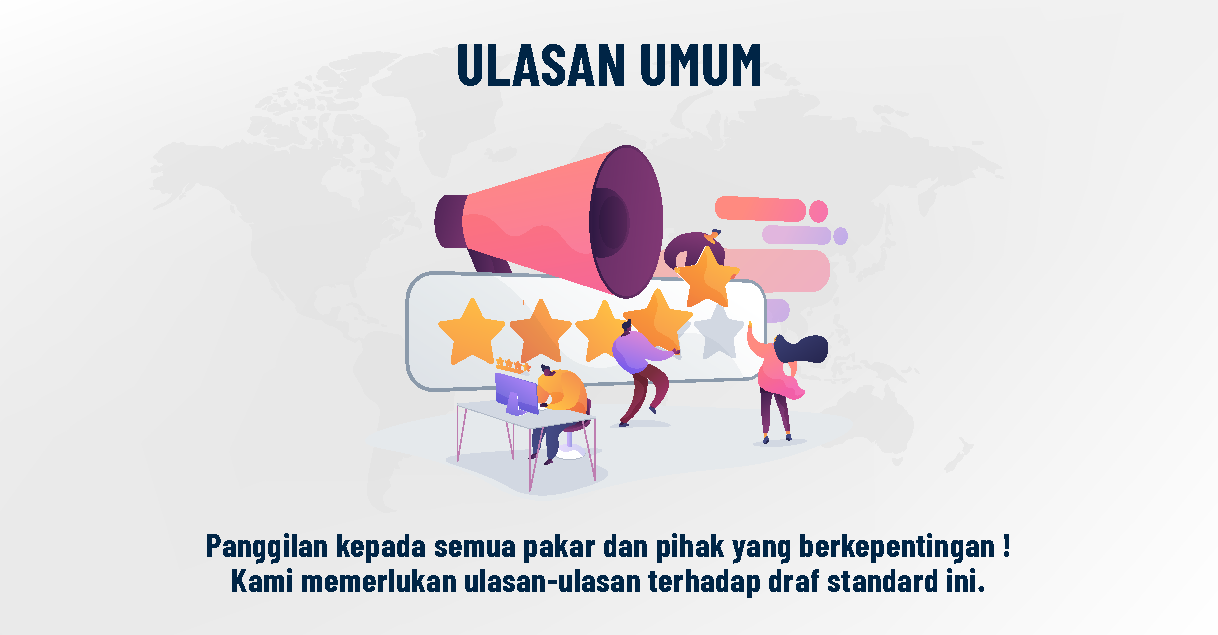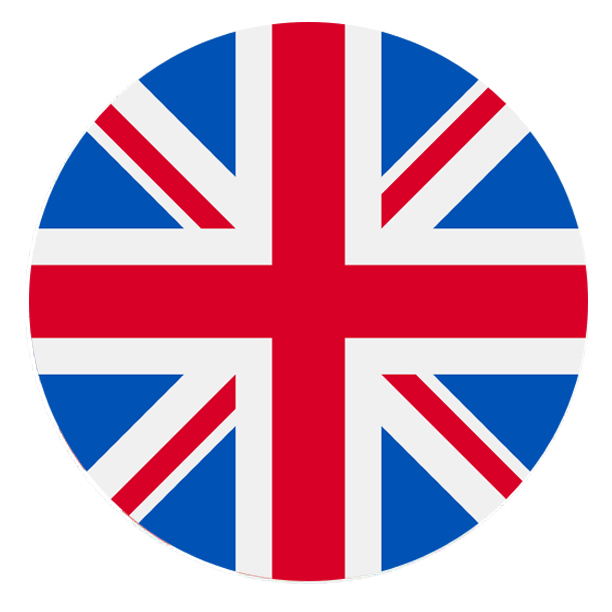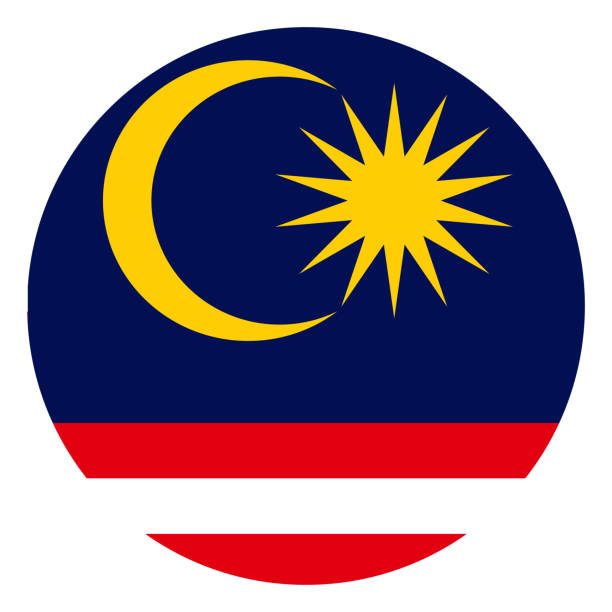Ulasan Umum adalah merupakan salah satu peringkat penting dalam pembangunan Malaysian Standard (MS). Jabatan Standard Malaysia (JSM) menjemput semua pihak untuk mengemukakan maklumbalas/komen terhadap draf MS, selaras dengan Artikel 4 dan Annex 3 Perjanjian WTO/TBT. Ini termasuklah Malaysian Standard (MS) yang baharu, semakan semula, pindaan dan penarikan balik MS sedia ada. Kesemua komen akan dipertimbangkan oleh Jawatankuasa Pembangunan Standard yang berkaitan di bawah seliaan JSM.

Untuk maklumat lanjut mengenai ulasan umum, sila hubungi:
Pasukan Ulasan Umum
Bahagian Standardisasi
Jabatan Standard Malaysia
CYBERJAYA
E-mel: pc[at]jsm[dot]gov[dot]my
-
Bil Tajuk Muat Turun 1 Ulasan Umum untuk Standard Dalam Pembangunan PDF -
15 JANUARI 2026 - 16 MAC 2026
DALAM PEMBANGUNAN
15 JANUARI 2026 - 16 MAC 2026
No.
Tajuk DMS
Skop
Pautan NSC 14 - RUBBER AND RUBBER PRODUCTS
1 DMS 1359-7:202X
Test method for raw natural rubber — Part 7: Determination of Mooney accelerated storage hardening test (MASHT)This Malaysia Standards specifies a method of measuring the storage hardening of raw natural rubber using the Mooney shearing disc
viscometer.VIEW 2 DMS 1359-8:202X
Test methods for raw natural rubber - Part 8: Determination of Wallace accelerated storage hardening test (WASHT)This Malaysia Standards specifies a method of measuring the Wallace accelerated storage-hardening of raw natural rubber. VIEW 3 DMS 2820-1:202X
Natural rubber field latex — Part 1: Determination of zinc content
This document specifies a method for the determination of the zinc content of natural rubber field latex by using atomic absorption spectrometry (AAS) or inductively coupled plasma-optical emission spectrometry (ICP-OES).
The method is not necessarily suitable for latices preserved with potassium hydroxide, latices from natural sources other than Hevea brasiliensis, or for compounded latex, vulcanized latex or artificial dispersions of rubber and it is not applicable to synthetic rubber latices.
Warning 1: Persons using this Malaysian Standard should be familiar with normal laboratory practice. This Malaysian Standard does not purport to address all of the safety and health problems, if any, associated with its use. It is the responsibility of the user to establish appropriate safety and health practices and to determine the applicability of any other restrictions.
Warning 2: Certain procedures specified in this document might involve the substance or the generation of waste, that could constitute a local environment regulation should be made to appropriate documentation of safe handling and disposal.
VIEW 4 DMS 2820-2:202X
Natural rubber field latex – Part 2: Determination of magnesium contentThis document specifies a method for the determination of the magnesium content of natural rubber field latex by using atomic absorption spectrometry (AAS) or inductively coupled plasma-optical emission spectrometry (ICP-OES).
The method is not necessarily suitable for latices preserved with potassium hydroxide, latices from natural sources other than Hevea brasiliensis, or for compounded latex, vulcanized latex or artificial dispersions of rubber and it is not applicable to synthetic rubber latices.
Warning 1: Persons using this Malaysian Standard should be familiar with normal laboratory practice. This Malaysian Standard does not purport to address all of the safety problems, if any, associated with its use. It is the responsibility of the user to establish appropriate safety and health practices and to determine the applicability of any other restrictions.
Warning 2: Certain procedures specified in this document might involve the substance or the generation of waste, that could constitute a local environment regulation should be made to appropriate documentation of safe handling and disposal.
VIEW -
5 FEBRUARI - 5 APRIL 2026
DALAM PEMBANGUNA
5 FEBRUARI 2026 - 5 APRIL 2026
No.
Tajuk DMS
Skop
Butiran NSC 18 - MEDICAL DEVICE AND FACILITIES FOR HEALTHCARE
1 DMS IEC/TR 62354:2014
General testing procedures for medical electrical equipment
This Malaysian Standard provides general testing procedures for medical electrical equipment.
This technical report applies to medical electrical equipment.
The object of this technical report is to provide guidance on general testing procedures according to IEC 60601-1:1988 (including the collateral provisions of IEC 60601-1-1:2000) and IEC 60601-:2005 and IEC 60601-1:2005/AMD1:2012.
Pegawai: Pn. Rul Aisyah Binti Mat Repin
Emel: aisyah[at]jsm[dot]gov[dot]my
-
15 FEBRUARI 2026 - 15 APRIL 2026
UNDER DEVELOPMENT
15 FEBRUARY 2026 - 15 APRIL 2026
No.
Title of DMS
Scope
Details NSC 19 - ELECTRICAL AND ELECTRONICS EQUIPMENTS AND ACCESORIES
1 DMS IEC 62305-1:2024
Protection against lightning — Part 1: General principles (IEC 62305-1:2024, IDT)
This document provides general principles for the protection of structures against lightning, including their installations and contents, as well as persons.
The following cases are outside the scope of this document:
– railway systems;
– vehicles, ships, aircraft, offshore installations;
– underground high-pressure pipelines;
– pipe, power and telecommunication lines separated from the structure;
– nuclear power plants.
The IEC 62305 series should be considered as a minimum requirement for these structures.Until any further information by CIGRE is available the lightning current parameters described in this document can be applied also for offshore installations.
Contact Person:
Mr. Mohd Noorhafiz Mohd Nasir
Email: noorhafiz[at]jsm[dot]gov[dot]my
Mr. Muhammad Haikal Muhaimin Hazahar
Email: haikal94[at]jsm[dot]gov[dot]my
2. DMS IEC 62305-2:2024
Protection against lightning – Part 2: Risk management (IEC 62305-2:2024, IDT)
Provides risk management of a structure due to lightning flashes to earth.
Its purpose is to provide a procedure for the evaluation of such a risk. Once an upper tolerable limit for the risk has been selected, this procedure provides a means for the selection of appropriate protection measures to be adopted to reduce the risk to or below the tolerable limit.
Risk management also includes the evaluation of frequency of damage of internal systems caused by surges due to lightning flashes to earth.
Once an upper tolerable limit for the frequency of damage has been selected, this procedure provides a means for the selection of
appropriate protection measures to be adopted to reduce the frequency of damage to or below the tolerable limit.
Contact Person:
Mr. Mohd Noorhafiz Mohd Nasir
Email: noorhafiz[at]jsm[dot]gov[dot]my
Mr. Muhammad Haikal Muhaimin Hazahar
Email: haikal94[at]jsm[dot]gov[dot]my
3. DMS IEC 62305-3:2024
Protection against lightning —Part 3: Physical damage to structures and life hazard (IEC 62305-3:2024, IDT)
This document is applicable to the:
a) design, installation, inspection and maintenance of an LPS for structures without limitation of their height,
b) establishment of measures for protection against injury to human beings primarily due to touch and step voltages.
NOTE 1 Specific requirements for an LPS in structures dangerous to their surroundings due to the risk of explosion are provided in Annex C.
NOTE 2 This document is not intended to provide protection against failures of electrical and electronic systems due to overvoltages. Specific requirements for such cases are provided in IEC 62305-4.
NOTE 3 Specific requirements for the protection against lightning of wind turbines are reported in IEC 6140024.
NOTE 4 Specific requirements for the protection against overvoltage of photovoltaic systems are reported in IEC 61643-32 and in IEC 62305-4:2024, Annex F.
Contact Person:
Mr. Mohd Noorhafiz Mohd Nasir
Email: noorhafiz[at]jsm[dot]gov[dot]my
Mr. Muhammad Haikal Muhaimin Hazahar
Email: haikal94[at]jsm[dot]gov[dot]my
4. DMS IEC 62305-4:2024
Protection against lightning – Part 4: Electrical and electronic systems within structures (IEC 62305-4:2024, IDT)
This document provides requirements for the design, installation, inspection, maintenance, and testing of surge protection measures (SPM) for electrical and electronic systems to reduce the risk of permanent failures due to lightning electromagnetic impulse
(LEMP) within a structure.
This document does not cover protection against electromagnetic interference due to lightning, which can cause malfunctioning of internal systems.
However, the information reported in Annex A can also be used to evaluate such disturbances. Protection measures against electromagnetic interference are covered in IEC 60364-4-44 and in the IEC 61000 series.
This document provides guidelines for cooperation between the designer of the electrical and electronic system and the designer of the protection measures, in order to achieve optimum protection effectiveness.
Contact Person:
Mr. Mohd Noorhafiz Mohd Nasir
Email: noorhafiz[at]jsm[dot]gov[dot]my
Mr. Muhammad Haikal Muhaimin Hazahar
Email: haikal94[at]jsm[dot]gov[dot]my
NSC 25 – QUALITY AND MANAGEMENT ORGANISATION
1. DMS ISO 13528:2015
Statistical methods for use in proficiency testing by interlaboratory
comparison (ISO 13528:2022 +
DAmd.1:202X, IDT)This document provides detailed descriptions of statistical methods for proficiency testing providers to use to design proficiency testing schemes and to analyse the data obtained from those schemes. This document provides recommendations on the interpretation of proficiency testing data by participants in such proficiency testing schemes and by accreditation bodies.
The procedures in this document can be applied to demonstrate that the measurement results obtained by laboratories, inspection bodies, and individuals meet specified criteria for acceptable performance.
This document is applicable to proficiency testing where the results reported are either quantitative measurements or qualitative observations on test items.
NOTE The procedures in this document can also be applied for the assessment of expert opinion where the opinions or judgments are reported in a form which can be compared
objectively with an independent reference value or a consensus statistic. For example, when classifying proficiency test items into known categories by inspection or in determining by inspection whether proficiency test items arise, or do not arise, from the same original source and the classification results are compared objectively, the provisions of this document that relate to nominal (qualitative) properties can be applied.Contact Person:
Ms. Nurul Izzati Othman
Email: izzati.othman[at]jsm[dot]gov[dot]my
-
15 JANUARI 2026 - 16 MAC 2026
-
Bil Tajuk Muat Turun 1 Ulasan Umum untuk Standard yang Ditarik Balik Tanpa Gantian Isi Borang PDF -
1 MARCH - 30 APRIL 2026
1 MARCH - 30 APRIL 2026
No.
MS Number
Title
NSC Approval Date
Justification for Withdrawal
NSC 19 – CHEMICALS AND MATERIALS
1
MS ISO 20504:2006 (CONFIRMED:2014) Fine ceramics (Advanced ceramics, advanced technical ceramics) - Test method for compressive behaviour of continuous fibre-reinforced composites at room temperature (ISO 20504:2006, IDT) 20/2/2026
This standard is no longer used by the fine ceramics related industry as it is outdated.
2 MS 1886:2005 Test method for pH aqueous solutions with the glass electrode 20/2/2026
This standard is no longer used as the soaps and detergents related industry refers directly to the latest ASTM E 70
3 MS 1887:2005 (CONFIRMED:2015) Test method for particle size of soaps and other detergents 20/2/2026 This standard is no longer used as the soaps and detergents related industry refers directly to the latest ASTM 502.
4 MS 1999:2007 Surface Active Agents - Determination of Foaming Power - Perforated Disc Beating Method 20/2/2026 This standard is no longer used as the soaps and detergents related industry refers directly to the latest EN 12728. 5 MS 2006:2007 Surface Active Agents - Foaming Power and Antifoaming Power - Turbine Stirring Method
20/2/2026 This standard is no longer used as the soaps and detergents related industry refers directly to the latest EN 13996. 6 MS 253:2001 (CONFIRMED:2016) Specification for scouring powder 20/2/2026 This standard is no longer used by the soaps and detergents industry as it is outdated. 7 MS 553:2002 (CONFIRMED:2014) Specification for detergent powder for hand wash household laundry (First revision)
20/2/2026 This standard is no longer used by the soaps and detergents industry as it is outdated. 8 MS ISO 11609:2003 Dentistry - Toothpaste - Requirements, Test Methods and Marking (ISO 11609:1995, IDT)
20/2/2026 This standard is no longer used and is outside the scope of the soap and detergent industry. 9 MS 2405:2011 (CONFIRMED:2015) Water Quality - Determination of the chemical oxygen demand (ISO 6060:1989, MOD) 20/2/2026 This standard is no longer used by the water quality industry as it is outdated. 10 MS 2624:2016 Safety data sheet for chemical products - content and order and order of the sections 20/2/2026 This standard is no longer used by the chemical industry as it is outdated.
11 MS 377:1976 (CONFIRMED:2004) Specification for sodium carbonate (Technical grade) 20/2/2026 This standard is no longer used by the chemical industry as it is outdated. 12 MS 430:1976 (CONFIRMED:2003) Specification for ink paste, black (Stencil, duplicating-machine) 20/2/2026 This standard is no longer used by the chemical industry as it is outdated. 13 MS ISO 2211:2010 Liquid chemical products - Measurement of colour in hazen units (Platinum-cobalt scale) (ISO 2211:1973, IDT) 20/2/2026 This standard is no longer used by the chemical industry as it is outdated. 14 MS ISO 2836:2001 Graphic technology - Prints and printing inks - Assessment of resistance to various agents (ISO 2836: 1999, IDT) 20/2/2026 This standard is no longer used by the printing and packaging industry as it is outdated. 15 MS ISO 6142:2005 Gas analysis - preparation of calibration gas mixtures - Gravimetric method (ISO 6142:2001, IDT) 20/2/2026 This standard is no longer used in testing or chemical-related industries as it is outdated.
-
1 MARCH - 30 APRIL 2026


